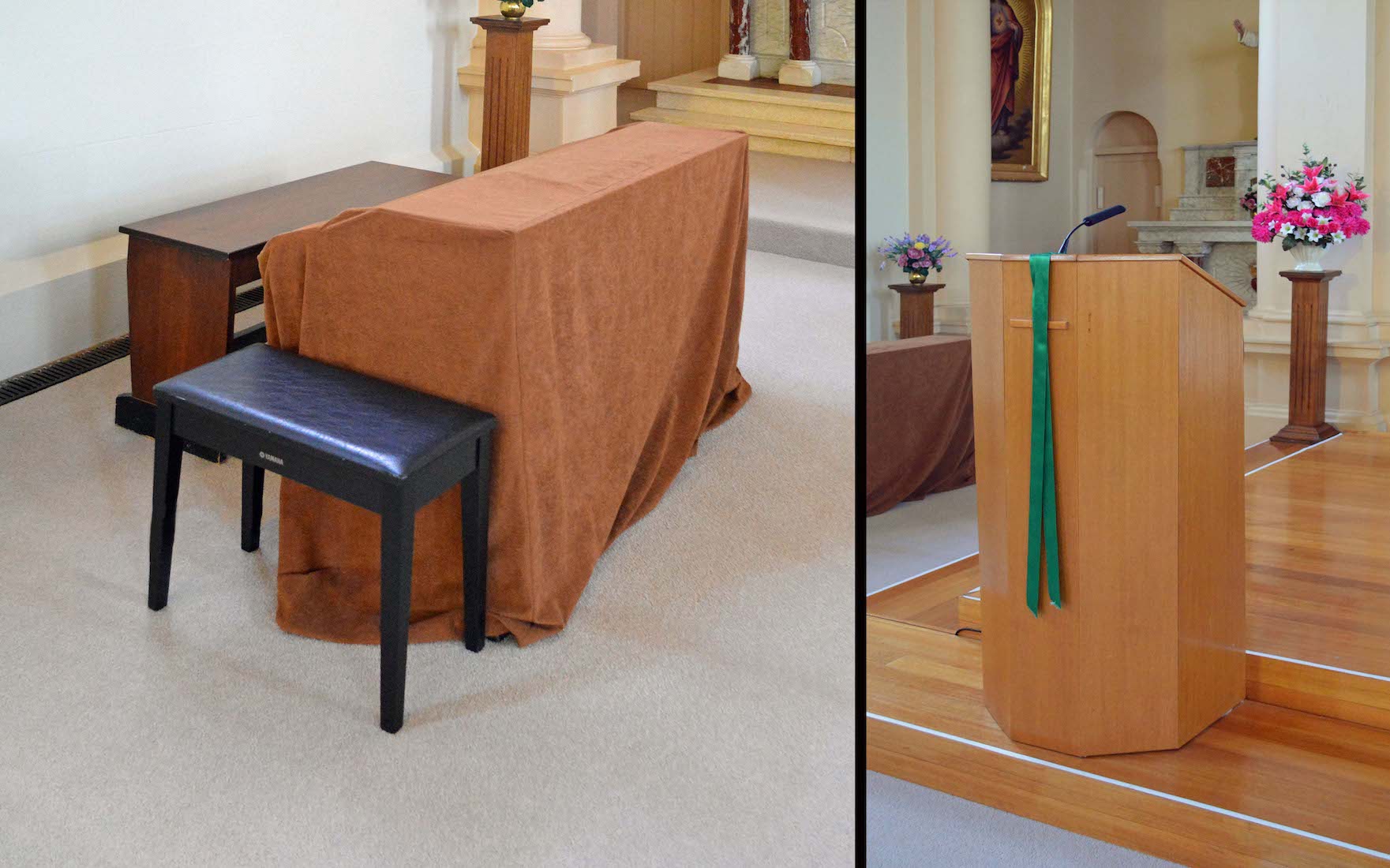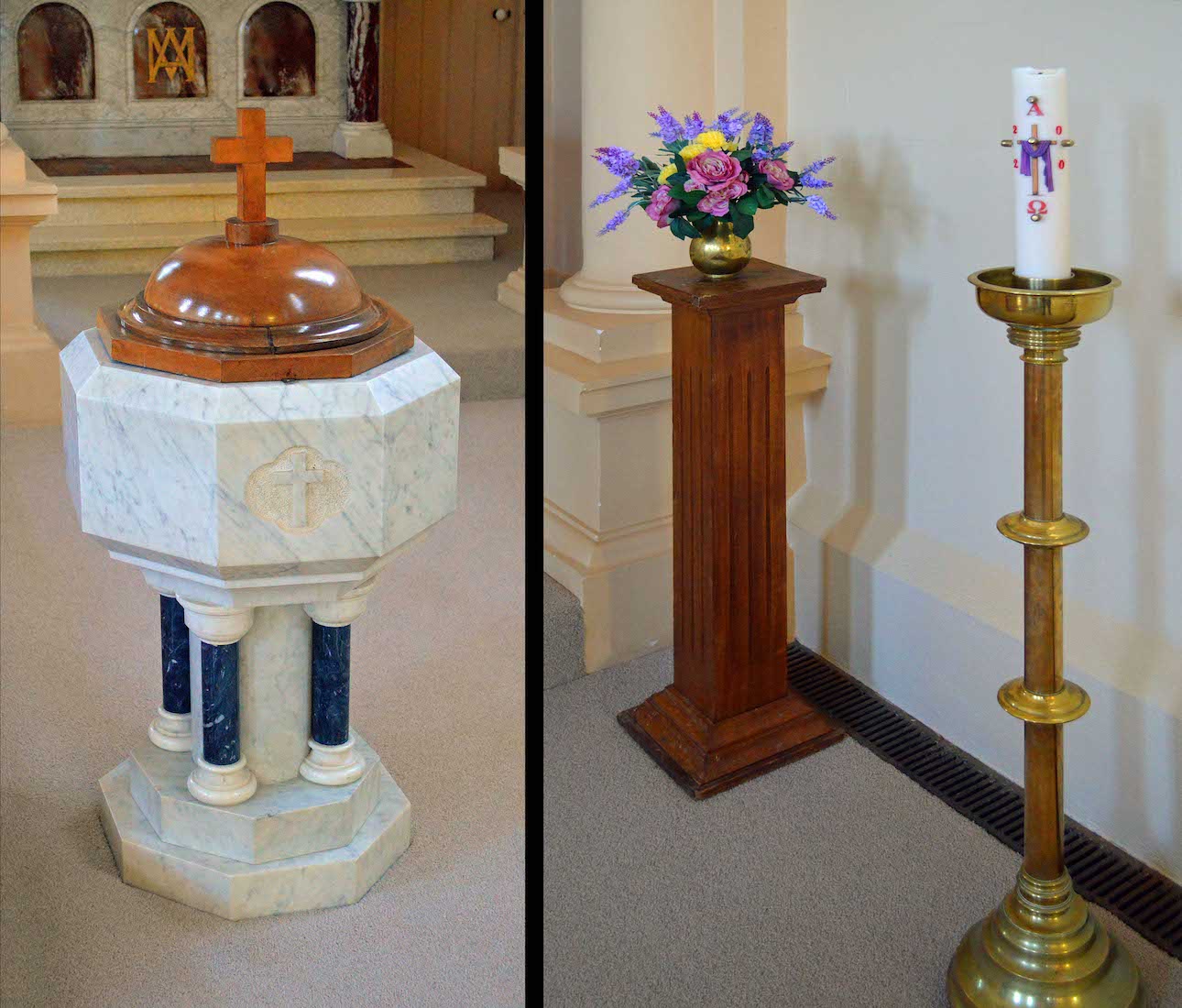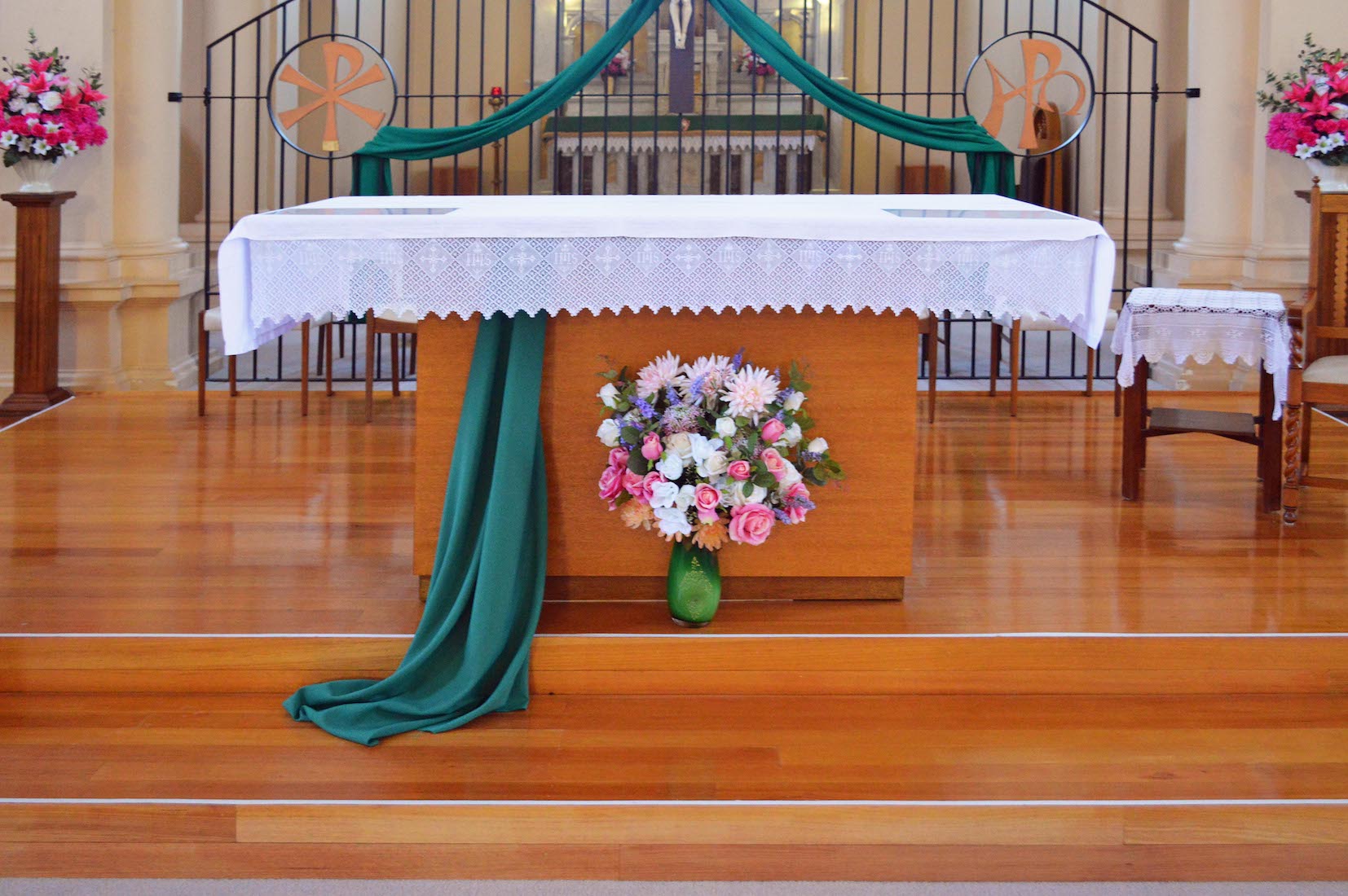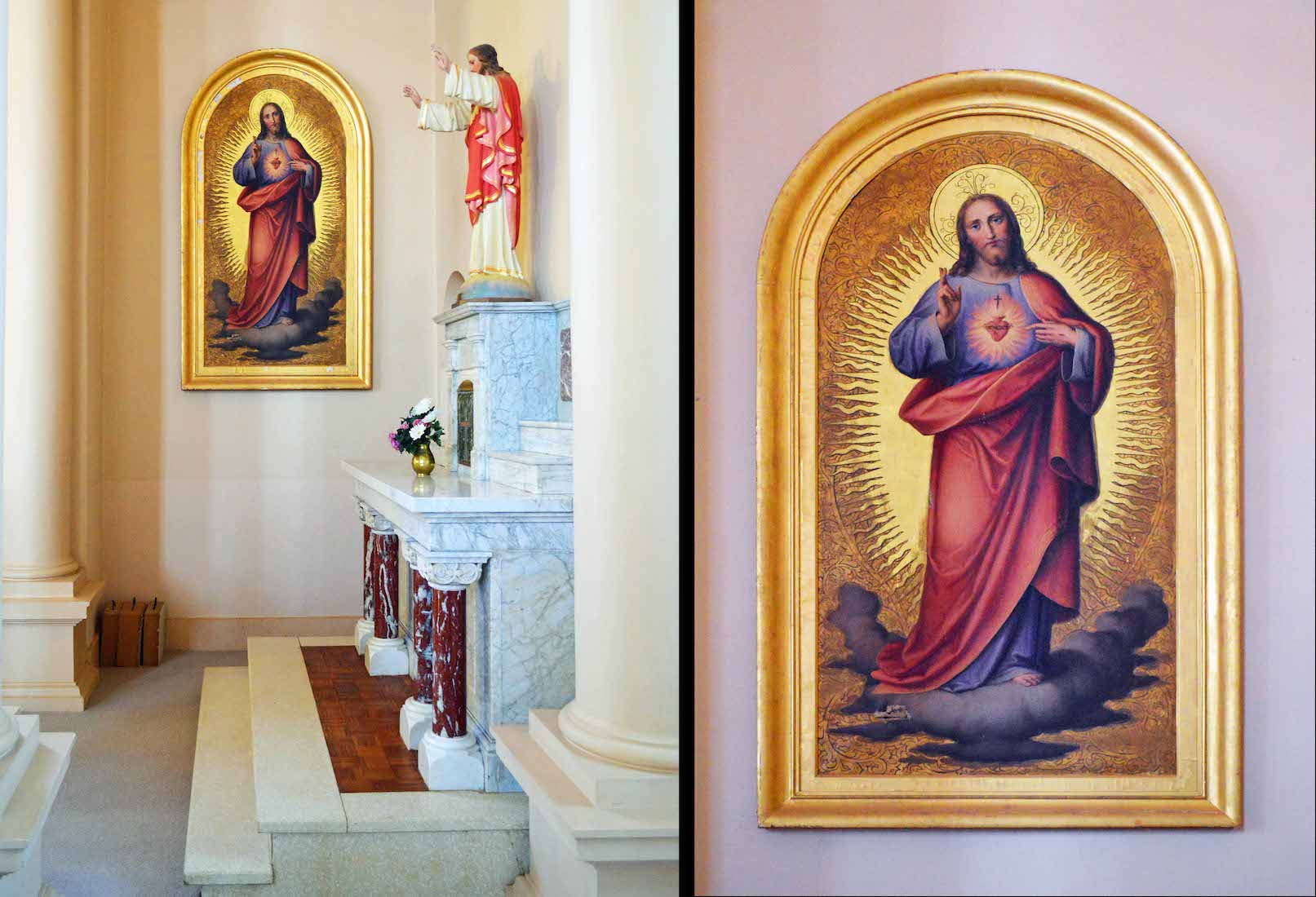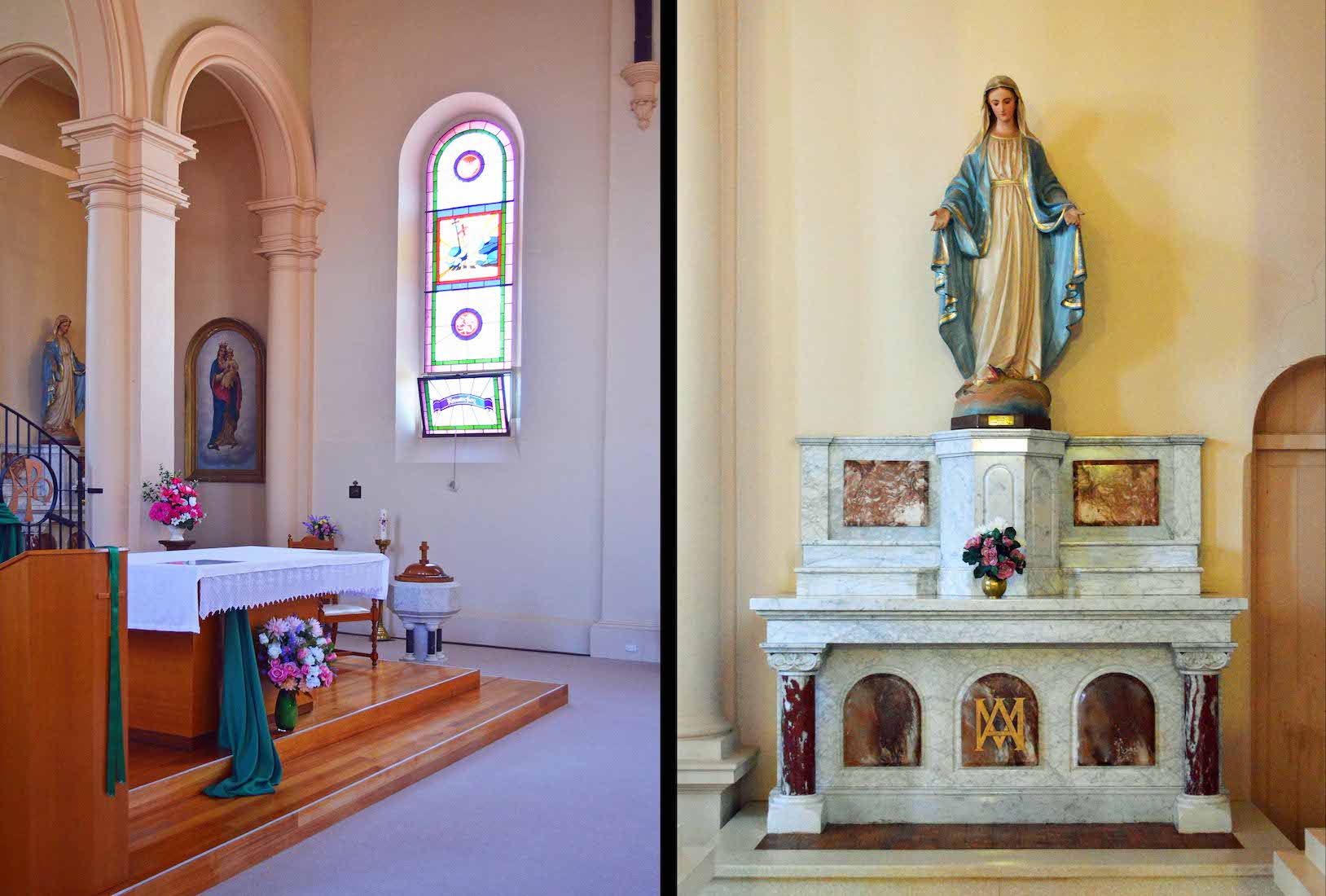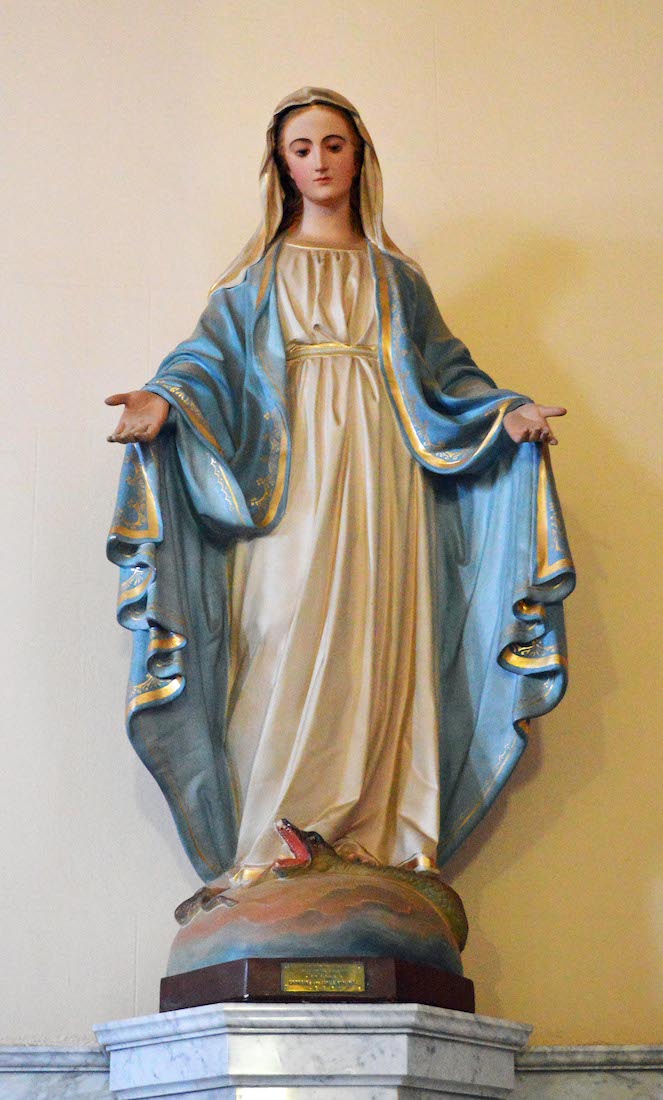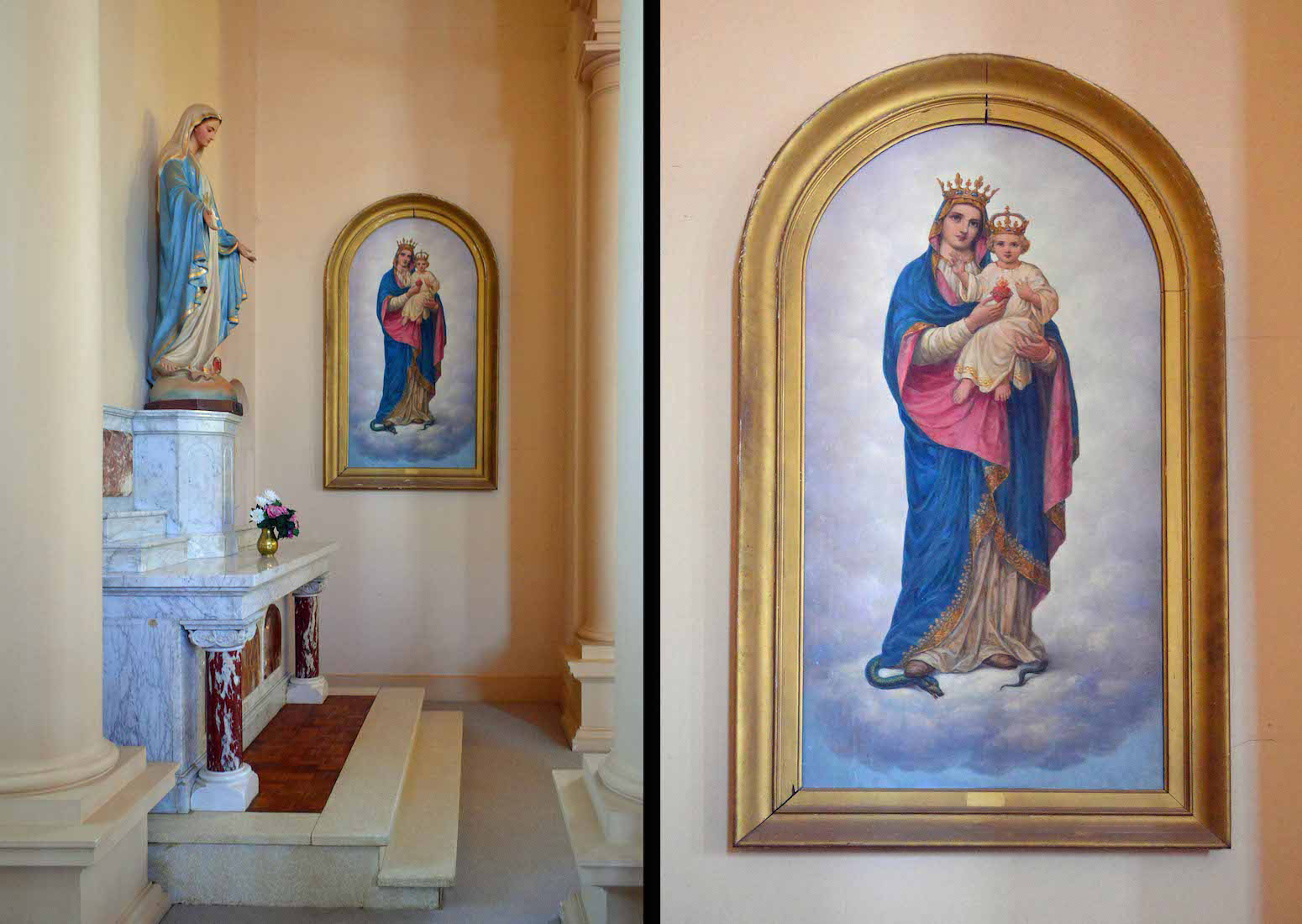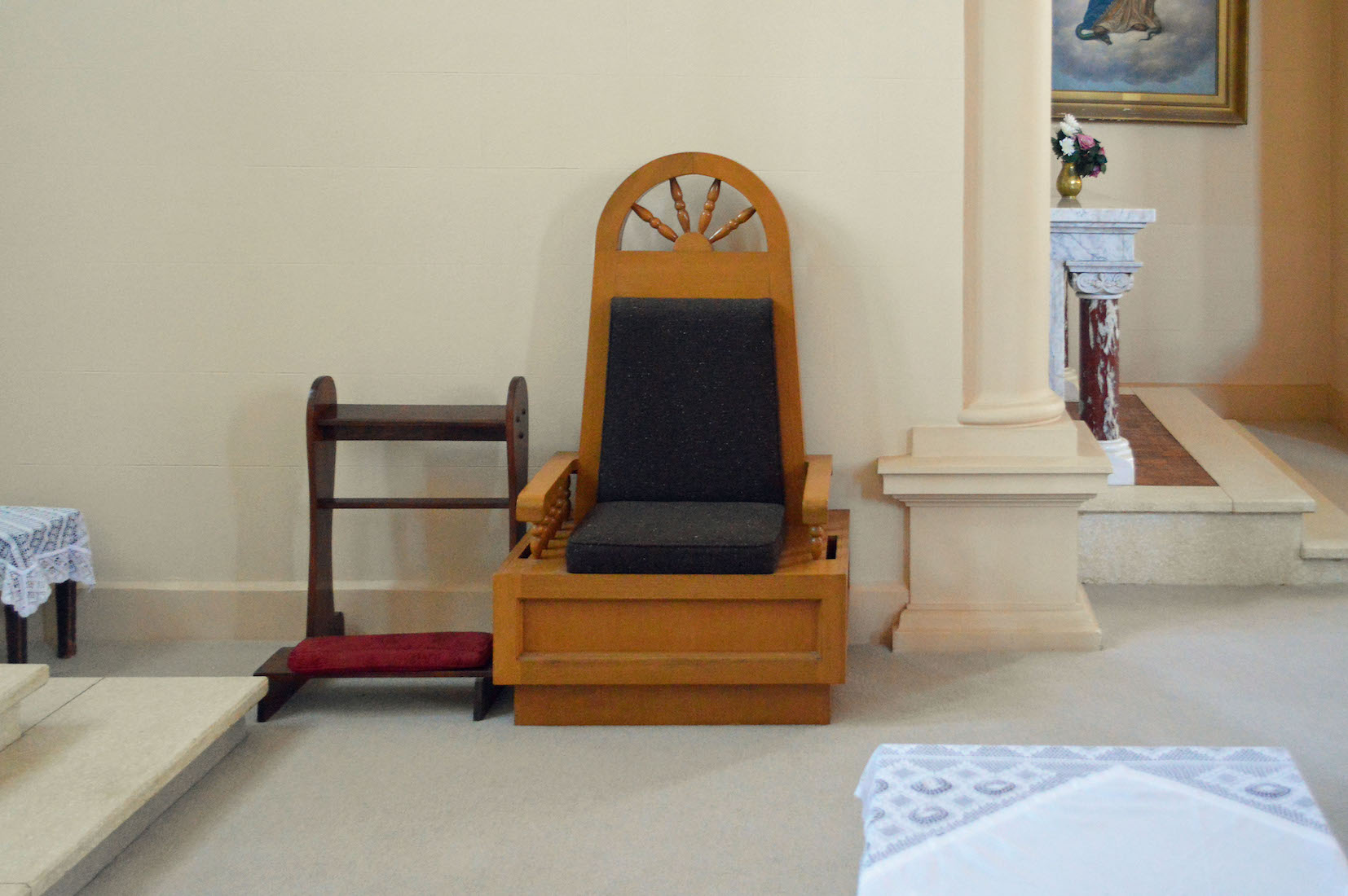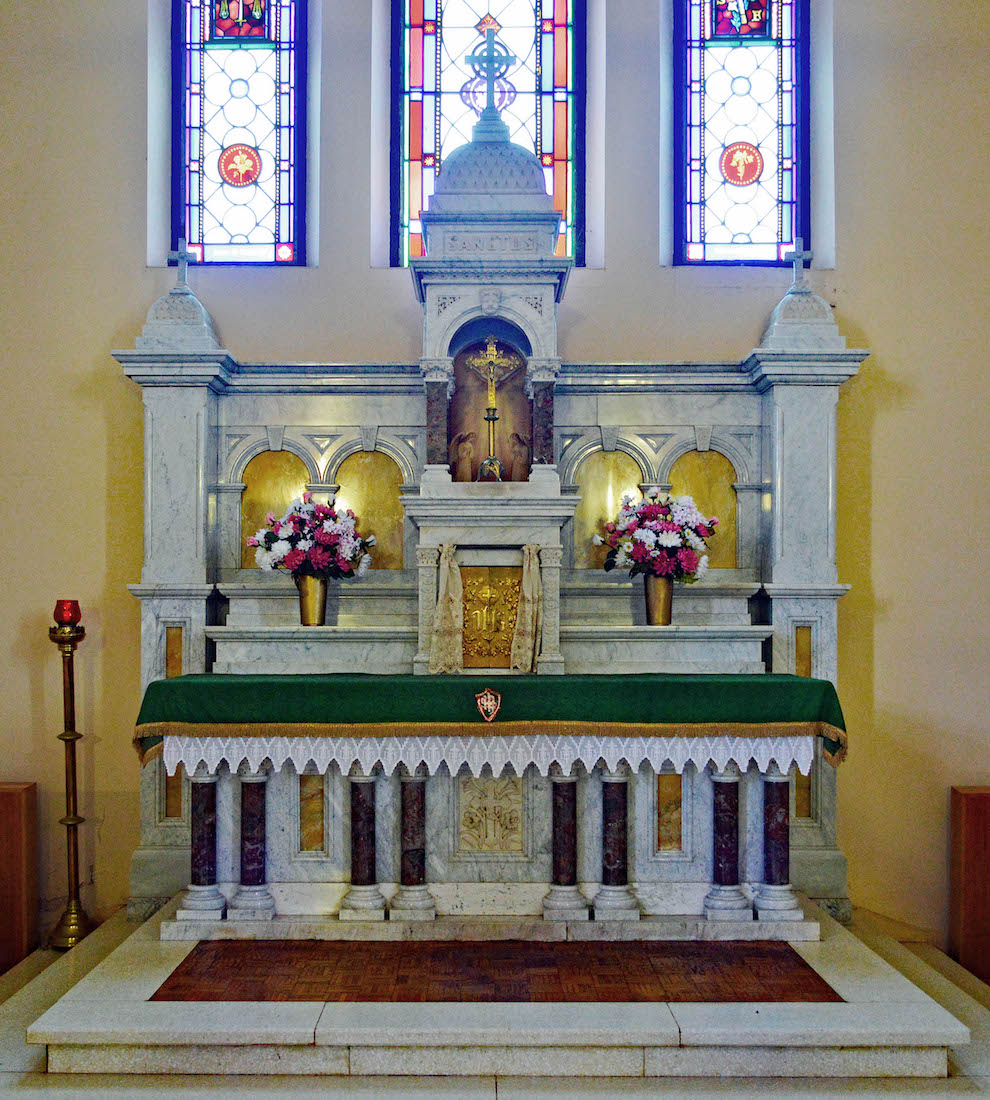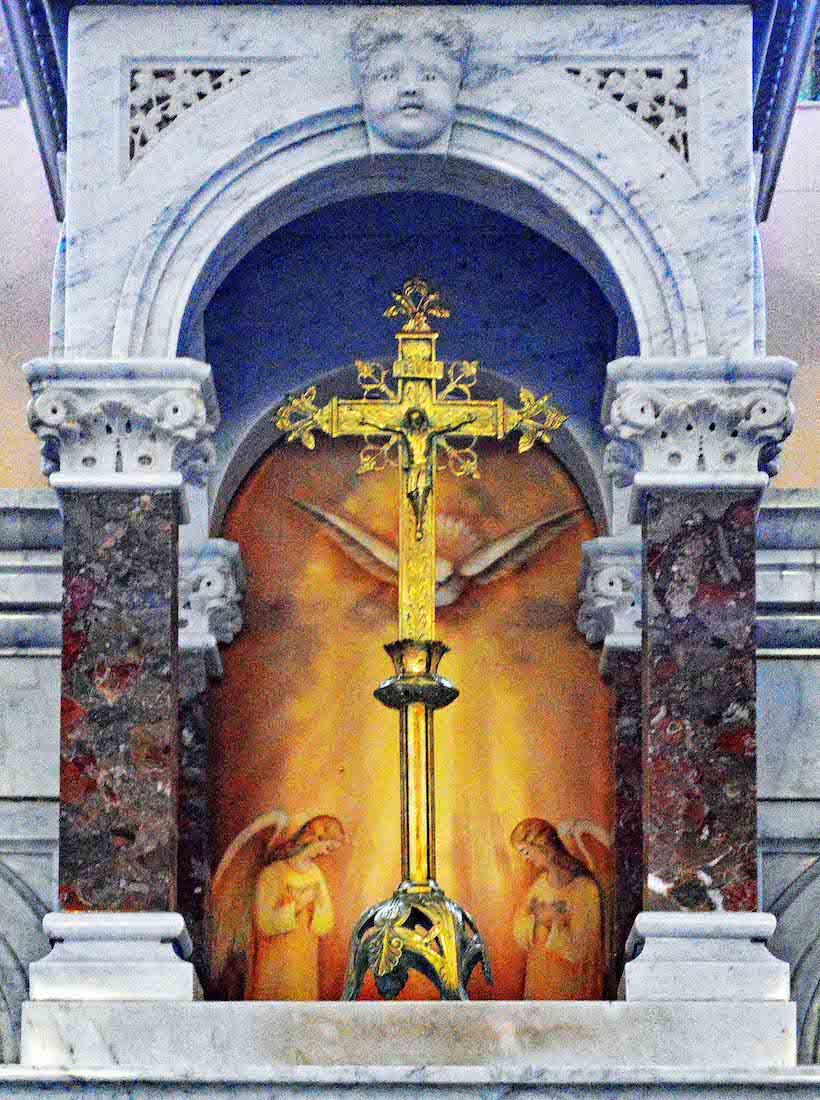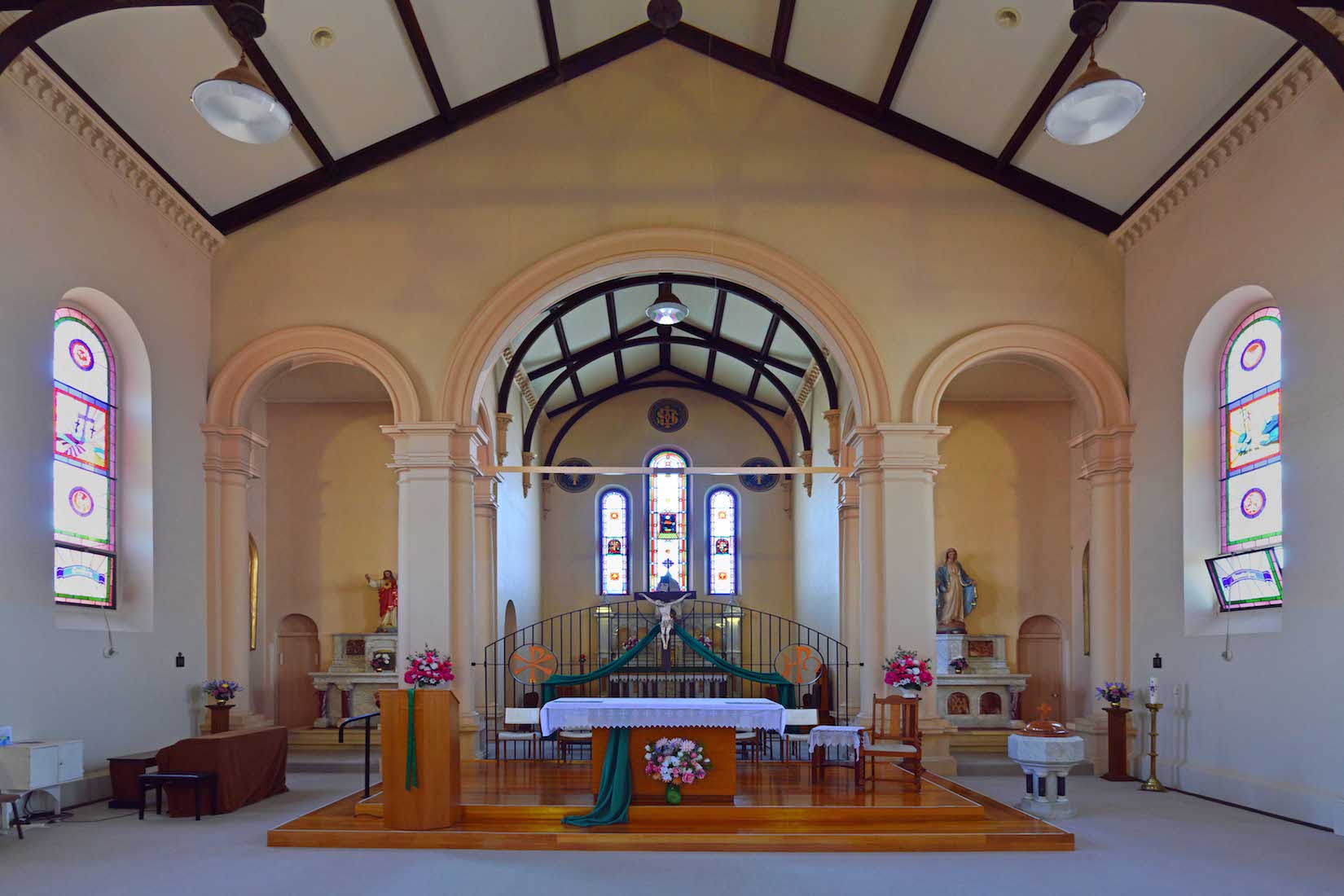
In this view of the Church sanctuary, we notice in particular, the window on each side, and then from left, the little organ, the ambo, the altar, the baptismal font and the Paschal candle. We might also comment on the colourful flowers – in fact, not real – which beautify this Church. SATELLITE VIEW
22. WINDOWS

Pictured are the North and South windows which are at the sanctuary end of the nave. Analysing them as before, we have A. Crucifixion; the cock crowing (a reference to Peter’s denial); the three crucifixion crosses; the crucifixion nails and crown of thorns. B. Resurrection; a sprig of flowers, indicating new life; the rock tomb being rent apart; a butterfly, also a symbol of new life.
23. ORGAN AND AMBO
Many smaller churches these days make use of an electronic organ: light-weight, easily moved, musically adaptable. •• The ambo is a combination lectern and pulpit: it is from here that the Scripture is read and the Gospel proclaimed.
24. FONT AND PASCHAL CANDLE
The baptismal font is used to baptise babies and children into the Christian life and also into the community of the Christian Church. The wooden cap and cross can be removed to reveal a metal dish holding water. •• The Paschal candle, or Easter candle, demonstrates that Christ is the Light of the World. It is lit particularly around Easter time.
25. NAVE ALTAR
The nave altar is a simple altar from where the Elements of the Eucharist are administered. It has the advantages over the traditional high altar, that the priest celebrating the Mass is closer to the congregation, and facing the congregation.
26. SCREEN BEHIND THE NAVE ALTAR
Behind the nave altar and the associated furniture stands a metal separating see-through screen. This might be seen as the equivalent of a traditional cathedral pulpitum. This screen has a crucifix at centre, and two forms of a Chi-Rho symbol, representing Christ. The symbol at left is the standard X-P. The symbol at right has a P and an implied X, formed from the letters Alpha and Omega. In the Book of Revelation (Rev 22:13) Christ is described as the Alpha and Omega, the First and the Last, the Beginning and the End. Alpha and Omega are the first and last letters of the Greek alphabet.
28. SACRED HEART
The Sacred Heart (also known as the Sacred Heart of Jesus) is a Roman Catholic symbol. It represents Jesus Christ’s actual heart as His love for all of humanity. The devotion to the Sacred Heart has a long history beginning around the eleventh century with St Bernard.
29. SIDE VIEW OF CHAPEL
A painting of the Sacred Heart hangs on the North wall of this chapel, but no details are given.
31. OUR LADY
In the Lady Chapel there is an altar bearing a statue of Mary, the Mother of Jesus. She is shown with her foot on a serpent, a reference to God’s words to the serpent in Genesis 3:15 … ‘And I will put enmity between you and the woman, and between your offspring and hers; he will crush your head, and you will strike his heel.’
32. SIDE VIEW OF CHAPEL
On the South wall of the Lady Chapel there is a painting of Mary and Jesus – also unaccredited.
33. CELEBRANT’S CHAIR
We leave the Lady Chapel and move towards the sanctuary, passing a special chair, used by the celebrant of the services.
34. HIGH ALTAR
We come to the high altar. This area serves as the sanctuary and also the Blessed Sacrament Chapel, with the altar bearing the tabernacle. In former times the Eucharist was administered from the high altar, but the general practice in Catholic and Anglican churches these days is to use the nave altar for this purple, except on special occasions.
35. EAST WINDOW
In the East wall behind the high altar is a three-lancet window showing various acronyms relating to Christ and Mary. At the centre is a depiction of the Sacred Heart.
36. TABERNACLE AND ALTAR DETAIL
The lower altar panel shows a carved Cross surrounded by lilies. The lily is a common symbol for the Virgin Mary. The delicately carved tabernacle doors show a Cross with the Christogram IHS. The tabernacle contains the Elements of the Eucharist.
37. CRUCIFIX
Above the tabernacle stands a crucifix, shown with worshipping angels and a hovering dove. This completes our tour of St Michael’s Church.
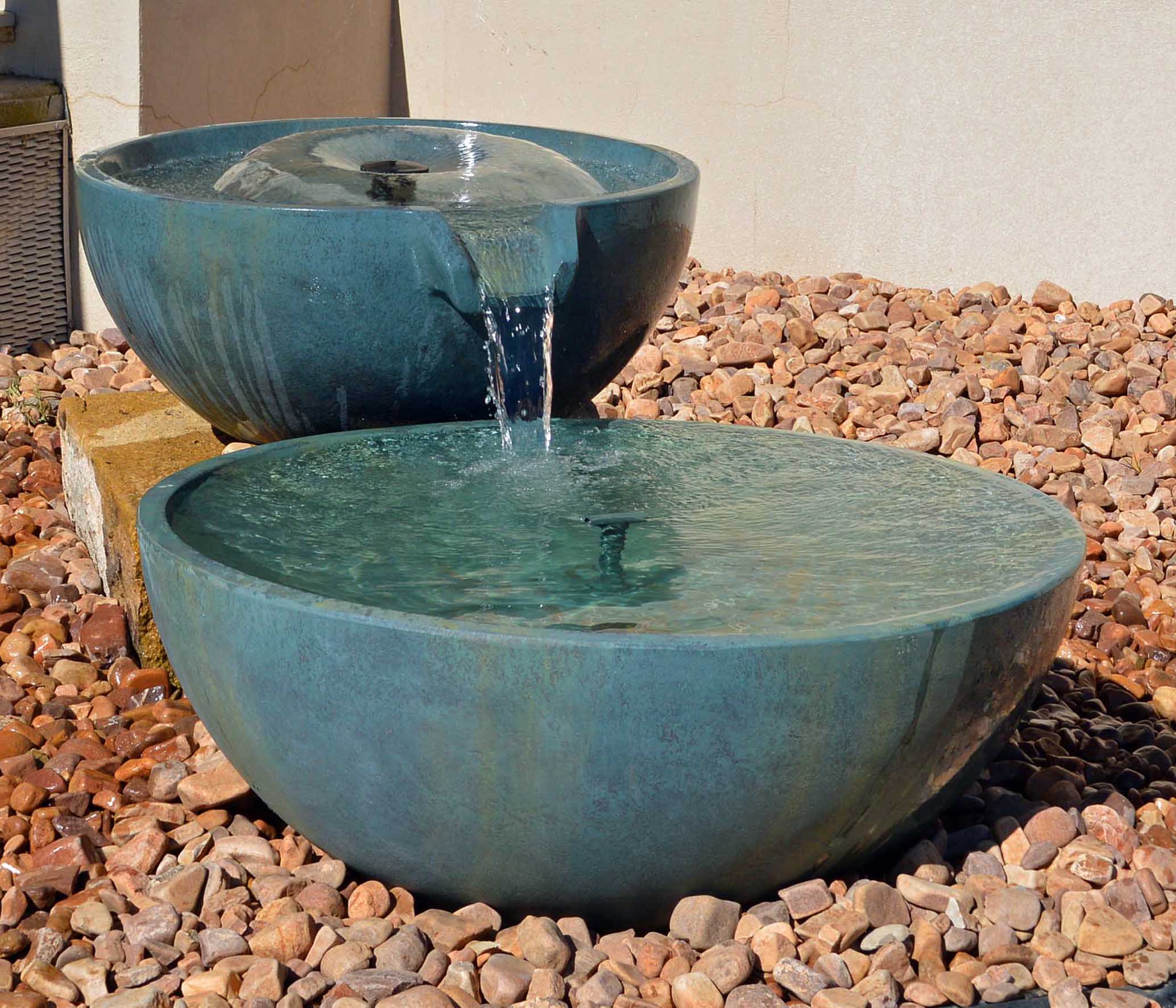
CONCLUSION
II hope you have enjoyed visiting St Michael’s Church, Clare with me. I have visited the town of Clare many times, so on this visit I was amazed to find this lovely Church!
I am happy to receive constructive comments or corrections concerning this website. The best websites are the ones which have no errors. I am grateful to my wife Margie who came with me, and who has proofread this site.
St Michael’s Church appears not to have a website, but its details are listed under
http://www.gcatholic.org/churches/oceania/39078.htm
The photographs which appear on this site are all mine, and can also be found in higher resolution at:
https://www.flickr.com/photos/paulscottinfo/albums/
Site created 11 / 2020
Paul Scott

